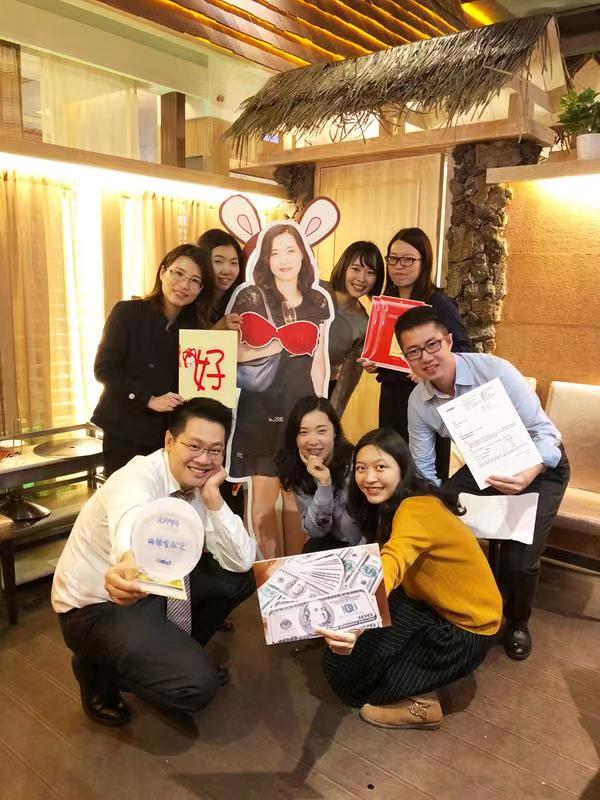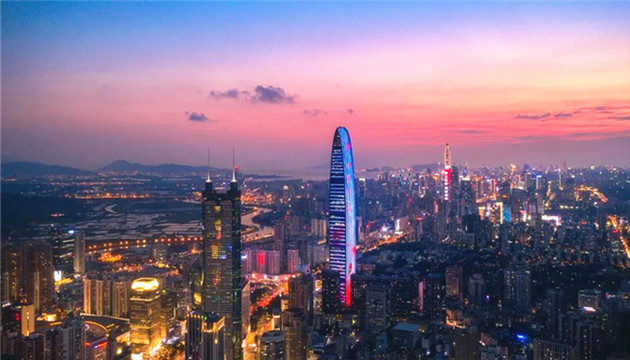
編者按
深圳改革開放40多年來飛速發展,創造出令世界刮目相看的偉大奇蹟。今日深圳,就是中華民族實現歷史偉大變革和中華民族偉大復興的一個縮影與見證。本欄目通過港澳台僑同胞、國際友人講述他們在深圳學習、工作、生活、創業的經歷和感受,展現敢闖敢試、開放包容、務實尚法、追求卓越的深圳氣質和宜居宜業宜遊的深圳魅力。在建設中國特色社會主義先行示範區的歷史性機遇下,深圳正以「改革不停頓、開放不止步」的奮進態勢開啟新征程,並以此向中國共產黨百年華誕獻禮。
Editor's Note
Over the past 40 years of reform and opening up, Shenzhen has developed rapidly, creating a great miracle that makes the world look at it with new eyes. Shenzhen today is the epitome and witness of the significant historical change and rejuvenation of the Chinese nation. Through the sharing of compatriots from Hong Kong, Macao, and Taiwan areas of China and the sharing of international friends, this column tells about their experiences and feelings of studying, working, living and starting a business in Shenzhen. It shows the Shenzhen temperament of daring to venture, openness and inclusiveness, being pragmatic and law-abiding, pursuing excellence, and Shenzhen’s charm of being suitable for living, business and tourism. Under the historic opportunity of building the first pilot demonstration area of socialism with Chinese characteristics, Shenzhen is starting a new journey with the momentum of "reform does not stop, opening up does not stop", and as a tribute to the centenary of the CPC.

作為畢馬威企業諮詢(中國)有限公司稅務合夥人,范家珩在16年前選擇到深圳工作,至今每日往返深港兩地。有着不斷開闊的視野和不曾動搖的專注,范家珩在見證兩地發展變化的同時,也收穫了自己的成功與充實。
2001年從香港中文大學畢業後,范家珩就進入了四大會計事務所之一的畢馬威工作,「那時候做香港稅,覺得很好玩,可以不同角度去看企業,通過自己的思考幫客戶省錢」。2003年,畢馬威決定加速發展中國稅務業務,需從香港調遣員工到深圳,范家珩成為其中的一員。「當時的想法很單純,覺得尋求發展,首先要放眼大市場,而內地的市場很大」。
事實證明,這一決定帶給范家珩帶來很多美好的感受。16年來,范家珩每日往返香港,每日也都在比較兩個城市。范家珩說,他見證了兩地的發展變化,無論是微信支付、交通、基建、民眾素質,「深圳的發展速度真的很驚喜」。
范家珩表示,慶幸自己選擇了深圳,深圳是最有活力的城市,政府氛圍好,民企眾多。起初這裏90%的客戶都是三星、飛利浦等外資或港資企業,現在超過70%的客戶是內地的民企。而這樣的體驗,只有在深圳才有機會發生。范家珩稱,深圳很多客戶並不出名,但其體量已經很大,且每天都在想如何做大做強,如何跨界、更好地利用互聯網發展等等,「這些民企思考的高度和遠度,超過很多歐洲企業,很有活力」。
初到深圳工作時,范家珩住在將軍澳,每日通勤單程都要兩個小時,而且經常加班至九、十點,到家已是十二點左右,第二天六點起床,如此反覆。除了通勤的辛苦,語言也是不小的障礙。儘管有很多文化差異造成的困擾,但范家珩表示,真的想做一件事,就不要找太多藉口。「不同的,並不一定是不好的」。范家珩認為,這只是一個心態問題,無須浪費精神專注於個別問題,而要記住自己的初心,勇往直前,收穫一定會比設想的更多,這也是他僅用十一年就成為合夥人的可貴經驗。
關於深港兩地的合作,范家珩有着自己的見解。「並不是簡單地把香港的優勢(例如金融、法律)與深圳的優勢(例如研發、創新)結合起來,而是應當成為一個大平台,一個unit(單元)」。
在給一些大企業做稅務計劃時,范家珩更需要將兩地放在一起全盤來看。「粵港澳大灣區、『一帶一路』、前海深港現代服務業合作區等概念的落地,稅是一個很好的工具」。堅持兩邊走,相信「合起來」可以做得更好。也正因此,范家珩感覺自己「有一點使命感」。在范家珩眼中,粵港澳大灣區擁有「兩個武器」,「其他大灣區的環境、人文、經濟都一樣,只有一個武器,但我們有兩個」。范家珩舉例稱,一個公司有研發、市場、生產、銷售、管理、物流很多功能,「哪個功能放香港好就放香港,哪個功能放深圳好就放深圳,比如物流放在香港,而研發放在深圳,但合起來是一個公司」。
Fan Jiaheng: remember the original intention, forge ahead bravely
--Partner of KPMG Consulting (China) Co., Ltd.
As a tax partner of KPMG Consulting (China) Co., Ltd., Fan Jiaheng chose to work in Shenzhen 16 years ago and has been travelling between Shenzhen and Hong Kong every day. With an ever-widening vision and unshakable focus, Fan Jiaheng has witnessed the development and changes of the two places, and gained his success and enrichment.
After graduating from the Chinese University of Hong Kong in 2001, Fan Jiaheng joined KPMG, one of the four major accounting firms. At that time, he thought it was interesting to do tax business in Hong Kong. He could see the enterprise from different angles and save money for customers through his own thinking. In 2003, KPMG decided to speed up the development of China's tax business and needed to dispatch its staff from Hong Kong to Shenzhen. Fan Jiaheng became one of them. " At that time, the idea was very simple: To seek development, we should first look at the huge market, and the mainland market is enormous. "
It is proved that this decision has brought Fan Jiaheng a lot of good feelings. Over the past 16 years, he has been travelling between Shenzhen and Hong Kong and comparing the two cities every day. He said that he had witnessed the development and changes of the two places, such as the Wechat payment, transportation, infrastructure, and people's quality. In his eyes, "the development speed of Shenzhen is really amazing".
Fan Jiaheng said he was glad to choose Shenzhen. Shenzhen is the most dynamic city with a good government atmosphere and a large number of private enterprises. At first, 90% of his customers here were foreign-funded or Hong Kong-funded enterprises such as Samsung and Philips. Now, more than 70% of the customers here are private enterprises in the mainland. Such an experience can only felt in Shenzhen. Many customers in Shenzhen are not well-known, but their sizes are already large. All the time, those enterprises are thinking about how to become bigger and stronger, how to cross the border, how to make better use of the development of the Internet, and so on. "These private enterprises think higher and further than many European enterprises, and they are very dynamic."
When he first came to work in Shenzhen, Fan Jiaheng lived in Tseung Kwan O of Hong Kong. He commuted two hours a day one-way, and often worked overtime until 9 or 10 p.m. When he returned home, it was about midnight, and he got up at 6 o'clock in the morning the next day. Besides the difficulty of commuting, language was also a big obstacle. Although cultural differences caused many problems, Fan Jiaheng believes that "if you want to do one thing, don't make excuses". "Sometimes being different is not a bad thing." Fan Jiaheng considers that it is just a matter of attitude. He does not need to waste his energy to focus on individual issues. Instead, he thinks he should remember his original intention, forge ahead bravely, and gain more than what he imagined. This is also his valuable experience of how to become a partner in only 11 years.
Fan Jiaheng has his own views on the cooperation between Shenzhen and Hong Kong. "Instead of simply combining Hong Kong's advantages, such as finance and law, with Shenzhen's advantages such as R & D and innovation, it should become a big platform and a unit."
When making tax plans for some large enterprises, Fan Jiaheng needs to put the two places together to take a comprehensive view. The concepts of Guangdong-Hong Kong-Macao Greater Bay Area, Belt and Road Initiative, and Shenzhen-Hong Kong modern service industry cooperation zone in Qianhai, Shenzhen began to land; tax is a good tool. Working together by insisting on both sides will generate better results. Fan Jiaheng felt that he had "a sense of mission". In his eyes, the Guangdong-Hong Kong-Macao Greater Bay Area has "two weapons". "The environment, culture, and economy of other bay areas are the same. They only have one weapon. However, we have two". Fan Jiaheng gave an example: A company has many functions, such as R & D, marketing, production, sales, management, and logistics." We can arrange a certain function in Hong Kong or Shenzhen based on in which city can the function work better. For instance, we can put logistics part in Hong Kong while R & D part in Shenzhen, but together it is one company."




